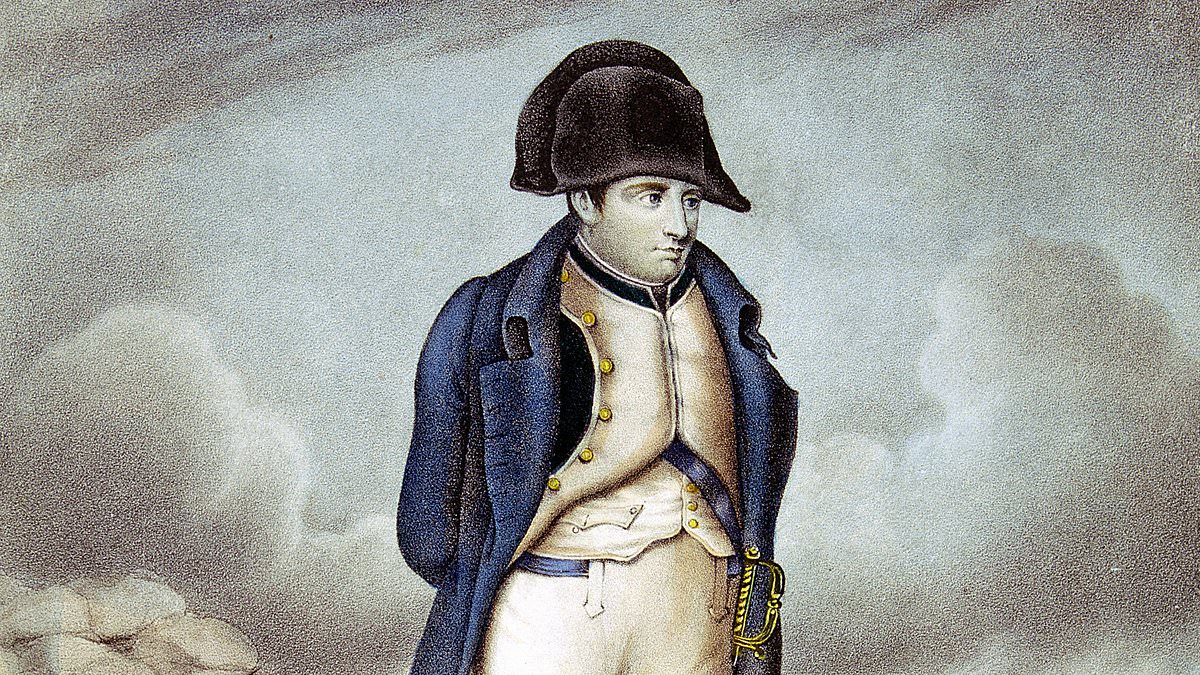A remarkable archive documenting Napoleon’s final days in exile has come to light after more than 200 years.
The never-before-seen cache of material includes a candid witness account describing his death on the remote island of St Helena on May 5, 1821.
It confirms that the former French Emperor was bedbound for almost two months before he ‘breathed his last sigh’.
He was constantly sick and in agony yet remained stoic and made ‘no complaint or lamentation’.
The ex-dictator was described as ‘the finest corpse ever seen and so noble, so dignified in his countenance’.
Other documents outline arrangements for his death mask, autopsy, funeral and the disposal of his belongings.
The letters were found in a trunk of military mementos for the Wynyard family which was stashed away in the garage of a property in the east of England.
Colonel Edward Buckley Wynyard was the former military secretary to Sir Hudson Lowe, the Governor of St Helena.
Napoleon was banished to the remote south Atlantic outpost in 1815 after his devastating defeat at Waterloo.
Colonel Wynyard, who came to the island in 1816, seemingly had a good relationship with Napoleon.
When he left there to return to Britain in 1820, the Little General presented him with a candlestick and Sevres china plate as a parting gift, which were also found in the trunk.
The Wynyard family archive is being sold by a descendant 204 years on at Reeman Dansie Auctioneers, of Colchester, Essex.
One letter penned by Major Gideon Gorrequer to Wynyard on the day after Napoleon’s death reads: ‘Bonaparte expired yesterday evening at 10 minutes before six.
‘Just at the very instant the sun sunk below the horizon he breathed his last sigh – he had been confined to his bed since the 17th March.
‘…He threw up everything almost that went down his throat would scarcely take any medication – or would not, or could not, take any nourishing.
‘He has been sinking ever since the first day he took to his bed.’
Maj Gorrequer added: ‘He has died in a manly proper manner no complaint, no invective, no lamentation or nonsense.
‘Extreme unction was given to him before his death, and from 6 in the morning yesterday to 6 at night, the whole of his attendants, from the highest to the lowest surrounded his bed in deep silence (Madame Bertrand and the rest of the females) till the moment of his dissolution.
‘His last day was one of graceful exclination- but I should think of little pain, if you can judge of his appearance as a corpse- near did I behold one to divested of all that is painful or horrifying to behold in death.
‘There was a serenity, a placidity, a peaceful slumbering affect in his countenance (when all the authorities staff naval and military went to see the corpse this morning at six) that had a strong effect on everyone who saw him.
‘He was by general and unanimously exclamations, declared the finest corpse ever seen there was something so noble, so dignified in his countenance.’
The archive is tipped to sell for £30,000 due to its ‘historical importance’.
A Reeman Dansie spokesperson said: ‘We are excited to offer a fascinating family archive of historical documents relating in particular to the death of the former French Emperor Napoleon Bonaparte on St. Helena, 5th May 1821.
‘The important letters were written by Major Gideon Gorrequer (1780-1841), who was the Aide-de-Camp to Sir Hudson Lowe and goaler of Napoleon, to his friend Colonel Edward Buckley Wynyard, the former military secretary to the governor, who served on St Helena from 1816 to 1820.
‘They reveal in great detail the circumstances of Napoleon’s death, the taking of his death mask, the autopsy, the preparation of his body and his funeral and subsequent arrangements over his personal belongings.
‘The collection also includes a Sevres china plate and a pair of candlesticks given by Napoleon to Colonel Wynyard as a parting gift.
‘The letters form part of a large Wynyard family archive.
‘They were an extraordinary family of soldiers and courtiers who for nearly 400 years served the British Empire.’
James Grinter, the specialist in charge of the sale, added: ‘The Wynyard archive has been in the attic then the garage and the family felt something of this historical importance should be in the public domain.
‘It was an extremely exciting find and the hair on the back of my neck literally stood on end as I read the letters about the death of Napoleon.
‘It was as if I was transported back in time.
‘I am sure they will create a sensation amongst Napoleon collectors.’
The sale takes place on May 3.
